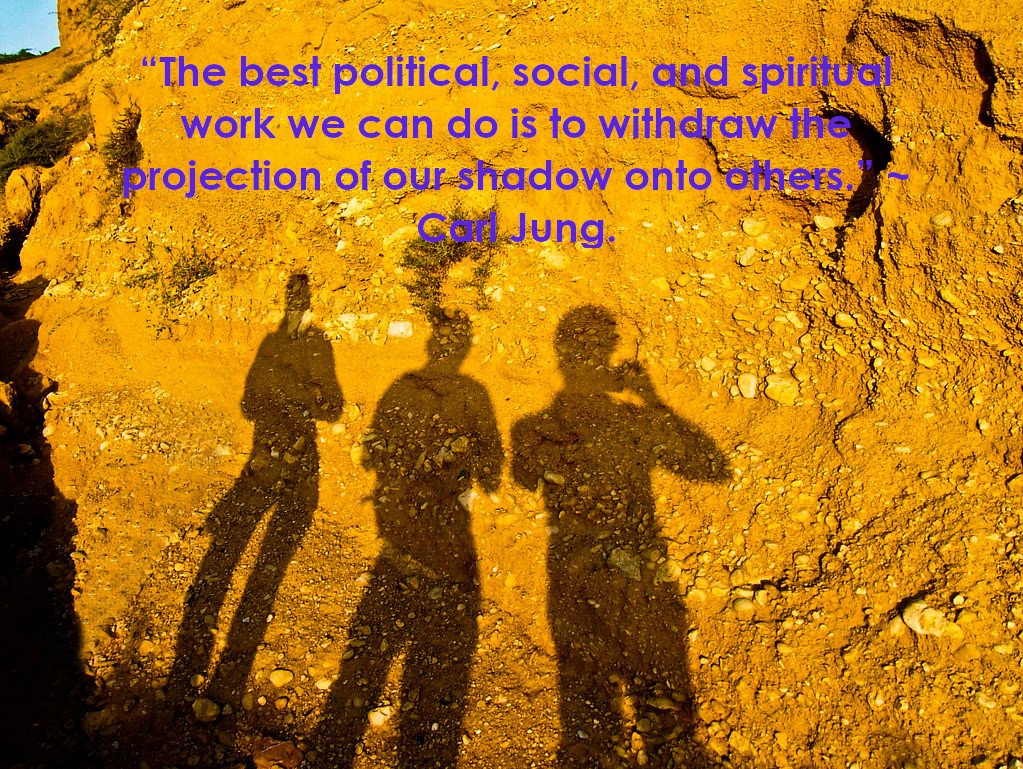
“The best political, social, and spiritual work we can do is to withdraw the projection of our shadow onto others.” ~ Carl Jung.
Jung’s quote implies that we often project our own unconscious aspects, such as fears, desires, or flaws, onto other people, and then judge them for having those qualities. This projection can lead to conflict, misunderstanding, and prejudice in our personal and social relationships. Jung believed that the best way to overcome this tendency is to withdraw the projection and recognize that those qualities are part of ourselves. By doing so, we can integrate our shadow and become more whole and authentic. This is not only beneficial for our own psychological growth, but also for our contribution to society and spirituality, as we can relate to others with more empathy, compassion, and awareness.
Jung’s concept of shadow refers to the unconscious aspects of our personality that we are not aware of or that we reject. The shadow can contain both positive and negative traits, but it is often associated with the darker side of human nature, such as impulses, emotions, desires, and fantasies that we may consider immoral, shameful, or unacceptable. According to Jung, the shadow is not only a personal phenomenon, but also a collective one, meaning that it is influenced by the cultural and historical context in which we live.
One way to see our shadow reflected in others is through the process of projection. Projection occurs when we attribute our own unconscious qualities to another person or group, without recognizing them as our own. For example, we may project our anger, fear, or guilt onto someone else and blame them for our problems. Projection can also happen positively, when we admire or idealize someone for having qualities that we lack or deny in ourselves. Projection can serve as a defence mechanism to protect our ego from confronting our shadow, but it can also prevent us from developing a more authentic and integrated self.
The law of attraction is a popular idea that states that we attract into our lives what we think about, feel, and believe. It is based on the assumption that the universe is a reflection of our inner state, and that by changing our thoughts, emotions, and beliefs, we can change our reality. An advanced part of this theory relates to the projection of our shadow, it means when we deny certain aspects of ourselves, then this rejection turns into an energy that actually attracts events and individuals that will highlight our shadows.
The law of attraction and Jung’s concept of shadow are related in the sense that both suggest that our outer world is influenced by our inner world. However, they differ in how they approach the process of change. The law of attraction tends to focus on consciously choosing positive thoughts, feelings, and beliefs to manifest our desires. However, Jung’s concept of shadow adds to this, the suggestion that it is not just our conscious self that is doing the projection of our hopes and wishes. But, that there is also the shadow side, which, unknown to the conscious self, is also projecting its wishes. And, that these may not be in alignment with the wishes of our conscious self, and could actually be stronger (how much of yourself have you rejected?) and therefore, the key determinant of what the universe provides for you.
Adding these two observations together; the shadows of self and the law of attraction, explains one of the universes primary mechanisms – how it offers healing to us. In short, the illness is our rejection of self, our unconscious shadow, this unconsciousness causes us to project the energy of this lacking into the universe, who responds, by delivering the mirror of that lacking.
To see our shadow more clearly and to integrate it into our conscious personality, Jung suggested that we need to engage in a process of self-exploration and self-acceptance. This can involve various methods, such as dream analysis, active imagination, art therapy, or psychotherapy. By becoming more aware of our shadow and its projections, we can reduce the conflicts and misunderstandings that arise from them and foster a more harmonious relationship with ourselves and others.
Subscribe to our post updates - Don't miss a thing!!







